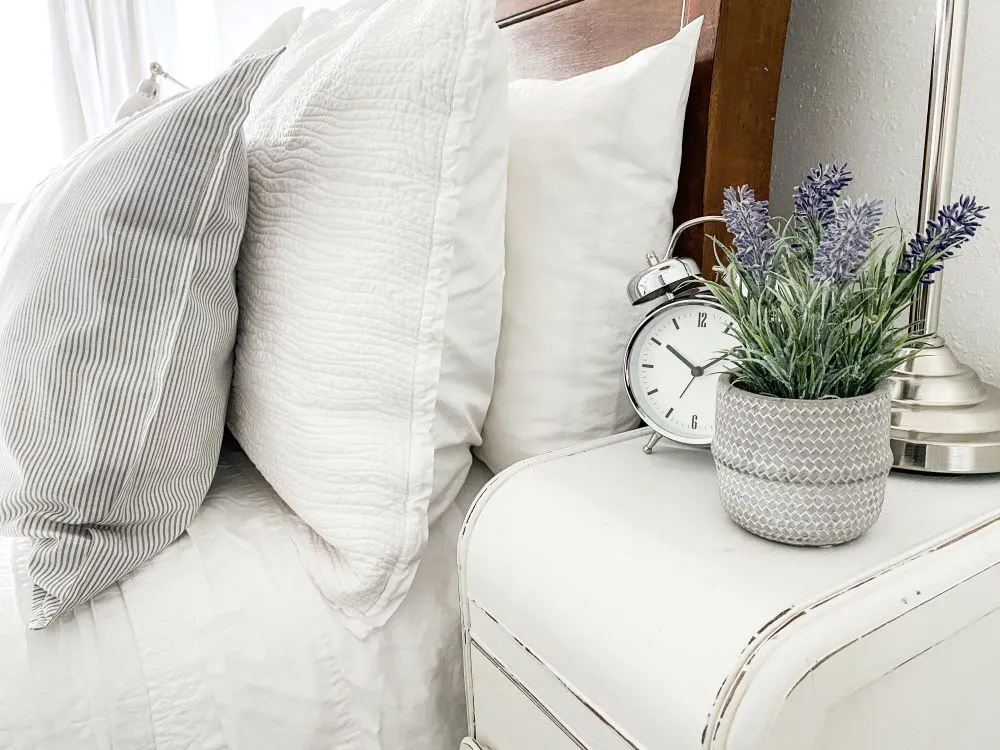How to Improve Your Sleep Health After a Cancer Diagnosis

Photo by Rayia Soderberg on Unsplash
People living with cancer frequently report having problems getting the right amount of sleep. Here’s how to approach common sleep disturbances so that you can get your z's.
Do you have trouble falling asleep, or staying asleep?
Like exercise and nutrition, good quality sleep plays an important role in our physical and mental health. Sleep helps our bodies perform many critical functions. It helps to improve our mood, regulate blood sugar, promote a healthy heart, and restore the immune system so that it can fight infections,1 to name just a few.
Despite all the benefits sleep provides, many people have a hard time getting enough of it.
If you are living with cancer, you might be experiencing sleep disturbances that prevent you from getting a good night’s rest. Maybe you are dealing with a recurring sleep challenge or sleep disorder that you had before your diagnosis. Or maybe you are facing a new sleep disturbance that emerged after your diagnosis or treatment.
“A good night’s sleep consists of 4 to 5 sleep cycles. Each cycle includes periods of deep sleep and rapid eye movement (REM) sleep, when we dream.”
— “The Benefits of Slumber: Why You Need a Good Night’s Sleep,” NIH News in Health
The National Cancer Institute reports that as many as half of people with cancer have problems sleeping.2 Research also suggests that people’s sleep quality can be affected for a long time after their cancer treatment has ended.3
How Can Cancer Affect Sleep?
For people living with cancer who have difficulty sleeping, different factors may be at play. Sleep disturbances might occur because of cancer-related symptoms, such as pain. In some cases, sleep problems might be a side effect of certain cancer treatments or drugs. Corticosteroids and hormone therapy, for example, can impact people’s normal sleep patterns.4
In other cases, people might experience fatigue as a side effect of their treatment, whether they experience sleep disturbances or not.
Find Tips to Manage Fatigue as a Side Effect
It’s also important to note that mental and emotional distress can impact sleep quality. Feeling nervous, anxious, worried, or depressed after a cancer diagnosis can keep people up at night and disrupt their sleep. If you feel that distress may be affecting you and your sleep quality in any way, talk with your healthcare team about these symptoms to create a plan of relief.
There are different types of sleep problems that can interfere with daily life. These include:
- Hypersomnia (sleeping for long periods – 10 hours or more at a time)
- Insomnia (difficulty falling asleep or staying asleep)
- Increased dream activity or nightmares
If you struggle with insomnia, you may feel tired, groggy, and unrested during the day. On the flip side, if you struggle with hypersomnia, you may sleep for a long period of time, find it hard to stay awake during the day, and feel tired even after taking a nap.
Whatever sleep challenge you may be facing, pay attention to how it’s impacting your day-to-day life. Lack of sleep and poor-quality sleep can influence your mood and make it hard to do everyday tasks and activities. For people who are in treatment, sleep problems may also worsen side effects.
Get Tips to Cope With Insomnia, Hypersomnia, & Nightmares
How Much Sleep Is Ideal?
The ideal amount of daily sleep is different for everyone. A young child needs more hours of sleep each day than the average adult. The CDC provides recommended hours of sleep, by age group, for the general population.5
Your personal sleep requirements might depend on other factors, too. If you are concerned that you may not be getting enough sleep — or that you might be getting too much — the best thing to do is to talk with your doctor or healthcare team about your concern. They will be able to advise you on the amount of sleep you should be getting.
Looking for Ways to Get Better Sleep?
Even if you don’t experience ongoing sleep disturbances, improving your quality of sleep might be a priority for you. Consider incorporating one or more the following strategies into your daily routine to support your sleep health and well-being:
Use a Sleep App
When it comes to sleep apps, there are plenty of options. These apps, which include well-known ones like Calm and Headspace, are designed to help people relax and achieve better sleep. Each app’s offerings will be a little different. If you like listening to relaxing music or stories, for example, look for an app with those features.
If you’re not sure where to start, articles and reviews on sleep apps can be helpful. The Sleep Foundation organized a list of the best sleep apps for smartphones and offers tips for choosing an app. Many sleep apps are subscription-based, but most offer free trial periods.
Or explore the free sleep apps in this list from Shape magazine.
Try Gentle Exercise
Exercise doesn’t need to be strenuous to help you sleep better. In fact, vigorous exercise too close to bedtime is not recommended. Gentle stretches and other light exercises, on the other hand, can help improve your sleep quality and how long you sleep.6
Research has linked the practice of yoga, specifically, to better sleep quality. That said, some styles of yoga are better than others to help you relax before going to bed. Johns Hopkins Medicine offers tips for choosing yoga styles to support sleep and relaxation.
Before embarking on a new exercise routine, be sure to discuss it with your healthcare team.
Practice Meditation
Mindfulness meditation is a practice that involves bringing your attention and awareness to the present moment to create a calming state of mind. Studies have found that mindfulness meditation can help improve the regulation and quality of sleep for people with sleep disturbances.
There are different techniques for practicing meditation. If you are new to the practice, you can find guided meditation videos in our Mind Body Studio to help you get started:
- Our video Healing Light Meditation uses breath and visualization to help you observe your thoughts and then let them go without judgement.
- Metta Loving Kindness Meditation uses the repetition of words and phrases to create a relaxed response from within.
“Even losing just 1 hour of sleep over a few days can have an effect. It can lead to a decrease in performance, mood, and thinking.”
Check Your Eating Habits
Some common foods and beverages can adversely affect people’s sleep quality. This includes caffeinated coffee, chocolate, energy drinks, and some teas and sodas. Caffeine, a stimulant, can disrupt people’s circadian rhythm and hormones that induce sleep.7 People with a sensitivity to caffeine may find it helpful to remove it from their diet or reduce their daily caffeine intake. Another option is to limit caffeine consumption to morning hours.
Other common culprits that can negatively affect some people’s sleep include alcohol, spicy or rich meals, and sugary drinks and snacks. Spicy or rich meals, for example, can cause indigestion or heartburn, which in turn may disrupt sleep.8
The Mayo Clinic suggests these dietary tips to help improve your sleep:
- Include quality sources of protein in your diet, such as fish, lean meats, beans, and eggs
- Add foods to your meals that are high in nutrients, antioxidants, and healthy fats like avocado, nuts, and seeds
- Make dinner your lightest meal of the day8
While diet and nutrition can play an important role in sleep health, always speak with your healthcare team before making any modifications to your diet.
Find Diet & Nutrition Tips to Support You During Cancer Treatment
Talk With a Social Worker
Talking with an expert like an oncology social worker can be helpful, in general, as you navigate cancer. Oncology social workers are trained in helping cancer patients and their families cope with and navigate a diagnosis. This includes identifying any social and emotional needs and providing services to meet them.
Talking with an oncology social worker about questions, worries, and concerns related to your cancer diagnosis can help ease distress. In turn, it may also help you sleep better at night. Ask your healthcare team if they can connect you with an oncology social worker.
As you try out different sleep-promoting techniques, pay attention to how they are supporting your sleep goals. Do you fall asleep more easily? Sleep through the night? Feel more rested during the day? If you do, you may have found a few winning strategies to build into your daily routine.
For people who are experiencing a consistent sleep problem or sleep disorder, strategies like these may not be enough. If you think you may have an ongoing sleep problem, talk with your healthcare team about your sleep patterns and concerns. There may be therapies, such as cognitive behavioral therapy or relaxation therapy, to help you relax.9
Your healthcare team can work with you to find treatments and support services to assist you so that you can get a good night’s sleep.
Editor's Note: This blog was originally published in May 2023 and has been updated.
- 1
Summer, Jay Vera; Singh, Abhinav. 8 Health Benefits of Sleep. SleepFoundation.org. Updated Feb. 29, 2024. https://www.sleepfoundation.org/how-sleep-works/benefits-of-sleep
- 2
National Cancer Institute. Sleep Disorders (PDQ)-Patient Version. Cancer.gov. Updated: Sept. 17, 2024. https://www.cancer.gov/about-cancer/treatment/side-effects/sleep-disorders-pdq
- 3
Zhou, Eric. Cancer Survivors’ sleep is affected long after treatment. Harvard Health Publishing. https://www.health.harvard.edu/blog/cancer-survivors-sleep-is-affected-long-after-treatment-202110222623
- 4
National Cancer Institute. Sleep Disorders (PDQ)-Patient Version. Cancer.gov. Updated: Sept. 17, 2024. https://www.cancer.gov/about-cancer/treatment/side-effects/sleep-disorders-pdq#_3
- 5
U.S. Centers for Disease Control and Prevention. About Sleep. CDC.gov. May 15, 2024. https://www.cdc.gov/sleep/about/index.html
- 6
DiNardo, Kelly. New York Times. Rest Better With Light Exercises. NYTimes.com. Updated Aug. 15, 2021. https://www.nytimes.com/2020/10/10/at-home/exercises-for-better-sleep.html
- 7
Bond, Louise. How does caffeine affect sleep? LiveScience.com. Feb. 2, 2023. https://www.livescience.com/how-does-caffeine-affect-sleep
- 8
Healthy habits for a better night’s sleep. MayoClinic.org. https://diet.mayoclinic.org/us/blog/2022/healthy-habits-for-a-better-night-s-sleep/
- 9
National Cancer Institute. Sleep Problems in People With Cancer. Reviewed: Aug. 12, 2021. https://www.cancer.gov/about-cancer/treatment/side-effects/sleep-problems
